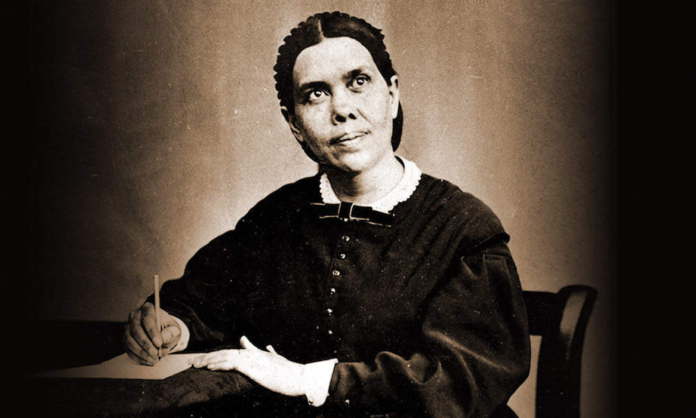Have I ever read Ellen G. White? .. Well of course I have .. It’s comforting to know that I will never become a Seventh Day Adventist and I’ve got Ellen G. White to thank for that.
Seventh-day Adventism grew despite endorsing a false date for Christ’s return. Um .. a rather dubious beginning!
Ellen G. White endorsed a false prophecy by William Miller that Christ would return, first in 1843 and then 1844. Miller repented when Christ didn’t show up on his date but Ellen didn’t want to be viewed as a false prophetess for endorsing him through her visions. The idea was concocted by one of her followers that the date was right, but the event was wrong. Ellen eagerly accepted this “out”, and this explanation was offered to explain away the false prophecy:
Christ didn’t come visibly to earth, but He, invisibly, in heaven, changed compartments from the Holy to the Most Holy in 1844 and began the work of “investigative judgment”.
This false date and its failure triggered other heresies on the atonement of Christ which continues to this day.
Honest-hearted SDA’s who have pointed out the error of the 1844 investigative judgment have been shown the door by their Conference. You sure won’t be told the true history behind the 1844 doctrine by SDA’s!
Embarrassing false prophecies by EGW have been, altered, covered up, and locked up by the SDA’s. You won’t be told about them, but here are a couple.
One false prophecy done in the name of the Lord marks that one as a false prophet (See Deut. chapter 18).
Ellen G. White said people alive in 1856 would be translated at the 2nd coming of Jesus. (Testimonies, V1, p 131,132).
She said in Testimonies for the Church, Volume 1, p. 259, that the United States would be “… humbled into the dust” by England during the Civil War.
No wonder Jesus told us to “Beware of the false prophets”. Time is their enemy. These false prophecies will never be mentioned by the SDA’s.
You won’t be told at the SDA Seminars about the things they have in common with the Jehovah’s Witnesses and Mormons.
SDA’s share their early history with the Jehovah’s Witnesses.
An early Adventist, N. H. Barbour co-published with Charles Taze Russell. They had a falling out over (what else?) dates for the end of the world! (1844 and 1874), and parted company.
Both, however, kept heretical doctrines to this day like Jesus being Michael the Archangel, the denial of Hell, and both still advocate soul sleep. Both invented invisible occurrences in heaven for their failed dates for Christ’s visible return, investigative judgment for the SDA’s and Christ’s invisible “presence” for Jehovah’s Witnesses.
There is a Mormon link also for the SDA’s. It is a proven fact that Ellen G. White plagiarized most of her writings. The Church has been challenged by Walter Rea, author of the White Lie to prove that even 20% of her writings are original. They can’t. Their weak defense was that there were no copyright laws in Ellen’s day, so what she did was legal. You will never be told of her plagiarism by the SDA’s.
As Ellen was rising to prominence, Joseph Smith had just died. Her writings contain many phrases used by Joseph Smith. Mind you, he has also been accused of plagiarism. You will definitely not be told of her similarities to Joseph Smith at the Seminars!
You really won’t be told about Ellen G. White’s engaging in necromancy, communication with the dead, expressly forbidden by God in Deuteronomy 18:10-12
“There shall not be found among you anyone … who casts a spell, or a medium, or a spiritualist, or one who calls up the dead. For whoever does these things is detestable to the Lord…”
This particular necromancy occurred after the death of her husband James, whom she called “Father”. She recounts the experience in a letter to her son published in “The Retirement Years” p. 161 – 163.
She begins her letter by stating that she was seeking God regarding her future, “A few days since I was pleading with the Lord for light in regard to my duty”…
It is evident she believed this dream was in response to her prayers to God. James (whom she called “Father”) appeared beside her as she was in a carriage. She reported he looked “very pale, but calm and composed”. (After all, he was dead!)
She says, “… I saw you die; I saw you buried. Has the Lord pitied me and let you come back …?”
We are not to have conversations with the dead, but Ellen and James converse back and forth about church matters and their health. At one point James foretells the future for Ellen, “… Now, Ellen, calls will be made as they have been, desiring you to attend important meetings…”.
James, her dead husband, goes on to tell her she must avoid taxing her strength by going to meetings and retire and write instead. He tells her, “…Make this your first business”.
Ellen now makes an agreement with her dead husband to stay in touch, … “Well, said I, James you are always to stay with me now and we will work together”.
This would involve further communication with the dead. Ellen recounts that she then awoke and took the whole matter as being from the Lord in these words, “…I feel no duty to go to Battle Creek…I have no duty to stand in General Conference. THE LORD FORBIDS ME. That is enough.”
Well, that is enough to conclude, not only the letter, but the fact that Ellen consulted the dead and took it all as coming from the Lord. She indicated she wanted to continue this practice.
Can we trust this dream? Of course not. How then are we to trust her other 200 or so “inspired by God” dreams and visions that occurred over her lifetime? We can’t, if we judge matters by the word of God.
You won’t be told EGW practiced necromancy at the Seminars.
As an SDA you will be encouraged to become a vegetarian.
Ellen indicated that your salvation could be dependent on giving up meat . No meat-eaters will be “translated” at Christ’s coming (Counsels on Diet and Foods p. 380).
You won’t be told this scripture by SDA’s
“… he who is weak in faith eats vegetables only…” (Romans 14:2). (Fun to read to vegetarians).
She taught in Counsels on Diet .. on p. 390 (some editions) that “…if we subsist largely upon the flesh of dead animals, we shall partake of their nature”.
Partake of their nature? This is against God’s creation laws of “kind”, and Impossible. Also conveniently forgotten is Paul’s view,
“Eat anything that is sold in the meat market, without asking questions for conscience’ sake.” ( 1 Cor. 10:25).
Obviously no vegetarians evident in the early church.
Most of EGW’s concerns over diet were in an effort to control what she considered to be an excessive sex drive in the male. She devoted endless pages to discussing “secret vice” (masturbation) and blamed the practice for a wide range of diseases. Here, in “Solemn Appeal” page 12 are a few of the diseases said to be caused by “secret vice” …
“…dyspepsia, spinal complaint, headache, epilepsy, impaired eyesight, palpitation of the heart, pain in the side, bleeding at the lungs, spasms of the heart and lungs, diabetes, incontinence of urine, fluor albus or whites, inflammation of the urinary organs… rheumatism, affected perspiration, consumption, asthma, catarrah, polypus of the heart, affection of the bones, fevers, ..etc. etc.”
The cure for secret vice was even funnier.
The perpetrator was to sit in a sitz bath at as low a temperature as possible. At the same time, he was to have a hot foot bath, while applying cold cloths to his forehead. He was also to wear an abdominal bandage or wet girdle at night “to good advantage”.
She concludes, “Cool bathing of the parts affected is also beneficial”.
Thanks to Ellen White’s influence, the Kellogg brothers were inspired to develop cold corn flakes, as hot porridge could “heat the blood” with undesirable results!
She sternly warned against using feathered beds for the same reasons, but a letter was found from her asking someone to send her a feathered bed! (EGW Vol 3, p. 341).
She also developed a “reform dress” on instructions from God, which was a bulky affair with pants under a long dress. She gave up on wearing hers finally, and so did the other women, after years of suffering discomfort.
Other assorted nonsense included Angels needing golden cards as gate passes to get in and out of heaven. (Early Writings p. 37-39),
She also “traveled” to other planets in her visions, and also claimed to have met Enoch (more necromancy). (EGW: The Early Years Vol.1 p. 114; p.157).
She taught that certain races of men are the result of amalgamation between man and beast. (SG Vol 3, p. 64,75). Which races? You won’t be told this one at the Seminars either!
EGW even extended her opinion to wigs. Any woman daring to wear one would “… lose their reason and go hopelessly insane”. (Christian Mothers, # 2, p. 121).
At any rate … for those of you who might plan to become an SDA .. read the documentation carefully. Ellen G White was no more a prophet than I am Ronald Reagan’s Bonzo.
My best advice, when considering the joining of any religious social club, whether it be the Catholics, Southern Baptists, or even, yes, the SDA’s .. go out and buy a good New American Standard Bible, or if you’re feeling exceptionally holy, and don’t mind reading scripture in an obsolete 300 year old language, a King James Version Bible and read, read, read .. study up on what God has to say before making your final choice on which religious club to join.






